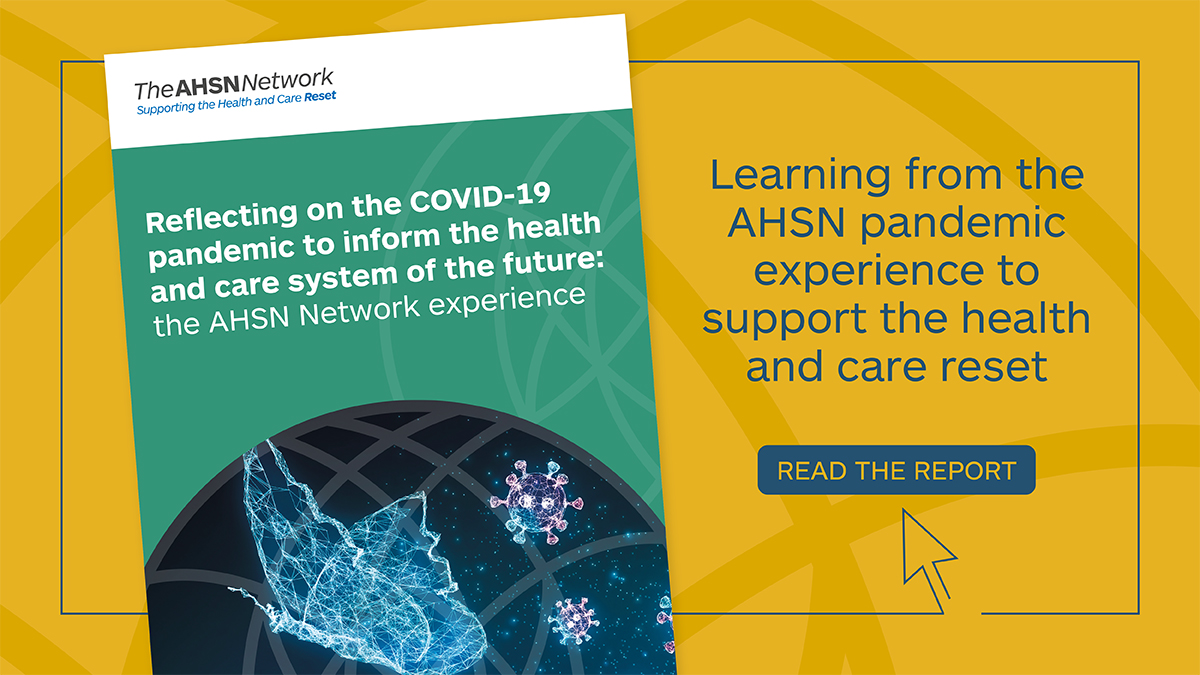The coronavirus (COVID-19) pandemic has had a significant and continued operational impact upon England’s health and care system. In parallel, we’ve observed innovation and transformation of services at an unprecedented pace and scale, with the adoption of digital technologies being a key feature. This innovation and transformation has, in the main, been brought about by a necessity to change at pace: flexing and shifting the system to focus on the care of coronavirus patients while continuing to deliver as much routine care as possible. Much of this rapid change presents a valuable opportunity to learn from and inform the future as we now begin to focus upon the reset and recovery of services. As experts in the spread and adoption of health innovation and best practice at pace and scale, AHSNs are well-placed to lead this translation of learning into practice
Not all of the changes observed throughout the pandemic should remain into the future, but we must take the opportunity to reflect and use the changes and progress made during the pandemic to lead to a more modern, responsive and flexible health service for the future. A robust yet rapid technique of identifying, evaluating – and where appropriate – adopting this learning and innovation across the country is needed, ensuring we capitalise on the opportunity we have been presented with to do things differently.
Since the onset of the pandemic there have been many phrases used to describe the process of restarting health and care services following the crisis: Recovery, Restoration, Renewal and Reset to name but a few. However, within the AHSN Network we’re clear that our focus should be on ‘resetting’. We cannot simply return to how things were in the past, but rather should be looking back at the rapid progress made in the short term, capturing the learnings, and using them to inform the future health and care system.
To capture these learnings and best practice, assimilate our findings, and provide recommendations that could be used to shape the health and care system of the future, the AHSN Network launched its Health and Care Reset Campaign.
The campaign captures learnings from the AHSN experience of the pandemic, including research we have undertaken, and focus groups and round-tables we have convened to collate insights and best practice. Based upon these learnings we are able to offer recommendations to help build a more equitable, innovative, and better prepared health and care system of the future. The learnings and recommendations are captured in our AHSN Network’s Reset Report.
The work undertaken as part of this review, complements our collaboration with NHS Confederation and the Health Foundation as part of the NHS Reset Campaign, with a specific focus on best practice and innovation. Our experience as leaders in health innovation and catalysts for change in England’s health and care system has proven invaluable throughout this work.

There is a wealth of HealthTech innovators poised to help solve some of the NHS’ greatest challenges, yet getting a product or new technology adopted at scale in the NHS is far from straightforward. In a recent ABHI member’s survey*, procurement was cited as one of the biggest barriers that innovators face, particularly those from [...]

Tellmi is a social enterprise innovation which aims to address the growing demand for mental health services and tackle health inequalities for young people. It is a digital peer support app available launched in 2017 by psychologist Suzi Godson PhD and engineer Kerstyn Comley PhD. Kersytn explains how Tellmi works. Tell us about the innovation. [...]

The NHS is facing record demand for services. According to The Health Foundation, the NHS waiting list for elective treatment in England has almost tripled in size over the last decade to 7.7 million. And latest figures show there were a record 2.35 million attendances at A&E across England in March this year. We know [...]







